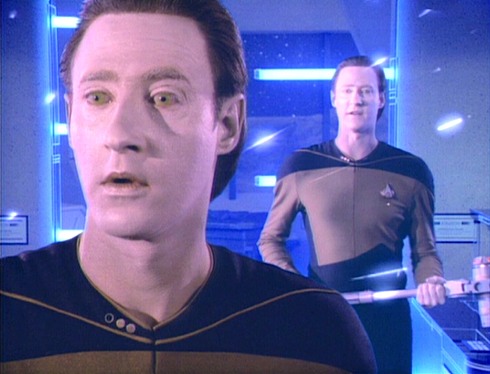“We’ll Always Have Paris”
Written by Deborah Dean Davis & Hannah Louise Shearer
Directed by Robert Becker
Season 1, Episode 23
Production episode 40271-124
Original air date: May 2, 1988
Stardate: 41697.9
Captain’s Log: Picard fences with Lieutenant Dean so Sir Patrick Stewart can show off all those fencing skills he picked up doing stage swordfights with the RSC. A moment in time repeats itself all across the ship. The Enterprise receives an automated distress call from Dr. Paul Mannheim on Pegos Minor. Picard recognizes the name, and explains to Riker that he was last known to be doing experiments with non-linear time.
The Enterprise responds to the distress call. Data explains that Mannheim was considered a visionary, particularly with regards to his theories regarding the relationship between time and gravity, but his theories never achieved widespread acceptance—because it’s a TV show, and TV show scientists are always eccentrics who never achieve widespread acceptance.
Troi notices Picard’s strong emotions at the sound of Mannheim’s voice and suggests he deal with those emotions before they arrive. Picard goes to the holodeck and re-creates the Café des Artistes as it was twenty-two years earlier, when he got cold feet for a rendezvous with someone.
Another ship and a farming colony report the same time repetition, while the Enterprise follows the distress signal to a relay in Pegos Minor and that leads them to the Vandor system.
Mannheim is having convulsions, and he and his wife beam aboard—the wife being Jenice, who eventually is revealed to be the rendezvous he couldn’t make at the Café des Artistes.
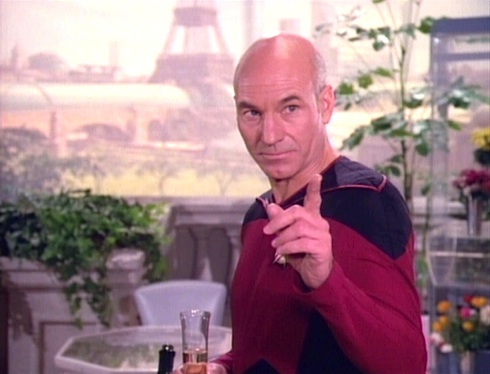
The time repetitions start happening again, which Data calls “the Mannheim Effect,” because these things need fancy-shmancy names, despite the fact that the term is never used again. Jenice explains that the rest of the team was killed in an accident.
Mannheim awakens and he says that he touched another dimension. His mind is still partly there, and he’s having trouble focusing. He had no idea the time distortion effects went beyond Vandor, and he urges Picard to shut it down. He provides the crew with the codes they need to do so.
Data beams down alone and is able to use antimatter to plug the gateway to the other dimension. As an added bonus, this cures Mannheim. He intends to continue his work, and the Mannheims beam back down.
Thank You, Counselor Obvious: Troi actually gets to do her job twice over, giving Picard good advice and attempting to help Crusher deal with her unresolved feelings toward Picard.
Can’t We Just Reverse the Polarity?: “There seems to be some kind of strange bouncing effect.” Transporter Chief Herbert with the hardcore science terminology.
Mannheim also gets a wonderful line when informed that Data is fully versed in his theories: “How is that possible? Even I am not fully versed in my theories.”
If I Only Had a Brain…: Data rejects the notion of the time repetition as a hiccup, as a different body function would be more appropriate. Picard interrupts him before he can specify whether or not it’s a fart or a belch. Picard also trusts Data to solve the problem himself, since he sees time as a constant and is less affected by the distortion.
He also uses a contraction at the climax when he proclaims, “It’s me!”
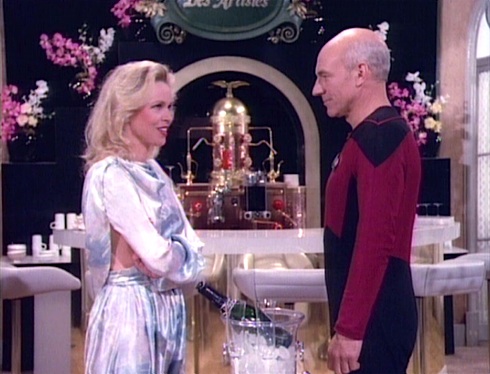
What Happens on the Holodeck Stays on the Holodeck: Picard re-creates the Café des Artistes in Paris, which, like all locations in Paris, has a perfect view of the Eiffel Tower. Picard brings Jenice there at the end so he can finally make their date—and say a proper goodbye—before she goes off with her husband.
No Sex, Please, We’re Starfleet: Jenice and Picard were an item twenty-two years earlier, but he chickened out of a date and shipped off, presumably on the Stargazer. The two have smoldering chemistry and Stewart in particular beautifully plays Picard’s regrets for what might have been.
Crusher, meanwhile, shows remarkable perspicacity with regards to Picard’s feelings as well as her own—politely declining Troi’s assistance.
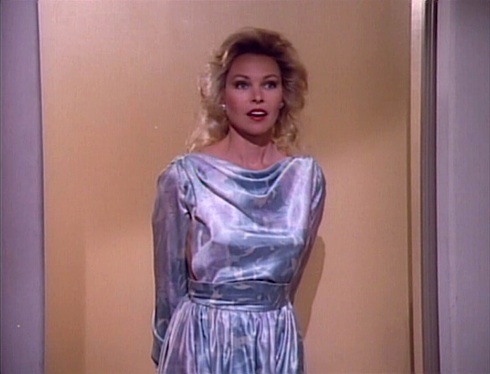
Welcome Aboard: The primary reason why anybody cares about this episode is that Michele Phillips, late of the Mamas and the Papas, plays Jenice, and she is incredibly radiant.
I Believe I Said That: “Are you all right?”
“Why wouldn’t I be? I’ve got one of the medical wonders of the galaxy dying in my sickbay.”
Troi trying to help Crusher, and Crusher snarking.
Trivial Matters: Besides the title and the similarity of the love triangle, the episode makes an additional Casablanca reference by Picard, Riker, and Troi talking about going to the Blue Parrott Café, which was the name of Signor Ferrari’s place in the movie. A certain author also set a scene in the Blue Parrott in his novel A Time for War, a Time for Peace (cough cough).
Deep Space Nine would later do their own Casablanca riff in the episode “Profit and Loss.”
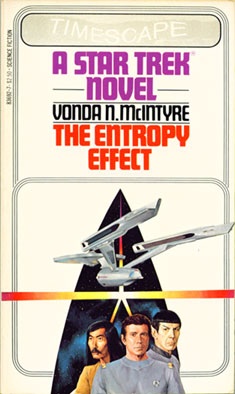 This episode’s plot also bears some similarities to Vonda N. McIntryre’s novel The Entropy Effect—woman from captain’s past, bearded scientist playing with time, the emotionless, scientifically minded character solving the problem, but by “patching” the time distortion rather than fixing it, and so on.
This episode’s plot also bears some similarities to Vonda N. McIntryre’s novel The Entropy Effect—woman from captain’s past, bearded scientist playing with time, the emotionless, scientifically minded character solving the problem, but by “patching” the time distortion rather than fixing it, and so on.
Make it So: “Nothing works as you hoped.” There’s nothing I can point to at this episode and say is wrong, but it’s one of the more forgettable episodes, honestly. It’s an interesting look into Picard’s past, and how much of an emotional coward he was as a youth, and Stewart and Phillips have magnificent chemistry, but the episode itself is kind of nowhere. The time jumps are minor and provide no sense of menace or danger—indeed, the entire episode is remarkably bereft of suspense or consequences. The result is a disappointingly flat, empty story that’s good for a few cutesy scenes between Picard and Jenice and not a helluva lot else.
Warp factor rating: 4.
Keith R.A. DeCandido has written a great deal of Star Trek fiction, including the Picard-focused short story “Four Lights” in The Sky’s the Limit, the Picard-focused comic book miniseries Perchance to Dream, and the novel Q & A, a post-Nemesis which features Picard and Crusher after they finally decided to become a couple. His more recent novels are Unicorn Precinct, SCPD: The Case of the Claw, and the upcoming Guilt in Innocence, part of the Scattered Earth shared-world science fiction series. Go to Keith’s web site, which is a gateway to his blog, Facebook, and Twitter.










